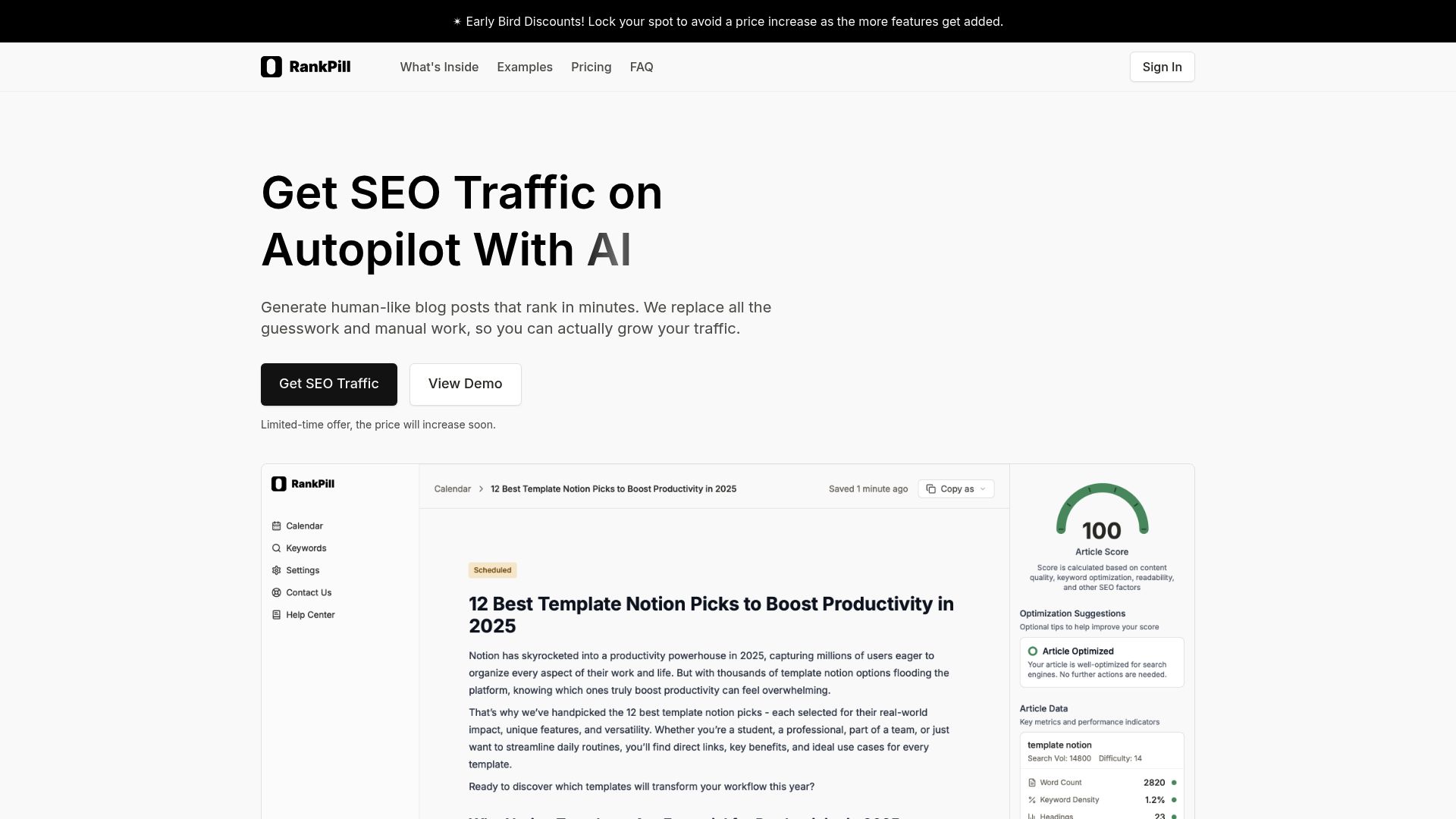In 2025, ignoring startup seo could mean watching your competitors surge ahead while you struggle to keep up. Startups face unique digital challenges, but effective strategies can turn search engines into powerful growth engines.
This guide reveals the 7 essential startup seo tips you need to thrive in a rapidly changing landscape. We’ll share proven tactics for keyword research, content creation, technical optimization, and more—each tailored for startups.
Did you know SEO can deliver up to 1000% ROI? Avoid common pitfalls, discover practical solutions, and follow our roadmap to lasting traction and sustainable growth.
Why SEO Matters for Startups in 2025
In 2025, the digital landscape is even more competitive—especially for startups. With limited resources and pressure to grow quickly, understanding the true impact of startup seo is crucial. Let’s break down why investing in seo is not just smart, but essential for startups aiming to scale efficiently and sustainably.

The Startup SEO Landscape
Startups face steep obstacles: low domain authority, tight budgets, and the need for fast traction. Unlike established brands, they can’t rely on a legacy reputation or massive ad spend. Here’s where startup seo becomes a game-changer—it allows new businesses to compete with industry giants on a more level playing field. According to Firstpage Sage, organic customer acquisition cost (CAC) is around 42.8% lower than paid channels, making seo a cost-effective growth lever. By focusing on sustainable tactics like content and authority-building, startups can create a solid foundation for steady traffic and qualified leads. For more on increasing authority, check out Building backlinks for SEO growth. In short, startup seo is the great equalizer for emerging companies.
SEO’s Impact on Key Startup Metrics
Startup seo directly affects the metrics that matter most—CAC, lifetime value (LTV), and monthly recurring revenue (MRR). Well-executed seo doesn’t just attract visitors; it brings in high-intent users who are more likely to convert and stick around. Studies show that seo delivers a return on investment (ROI) between 275% and 1000% (Profitworks), and B2B companies generate twice as much revenue from organic search compared to other channels (BrightEdge). Even better, leads from startup seo tend to have lower churn rates, since they’re often more informed and engaged from the start. For any founder obsessed with metrics, seo is a lever that moves the needle across the board.
SEO vs. Paid and Viral Growth Channels
It’s tempting for startups to pour money into paid ads or chase quick wins with viral tactics. However, startup seo offers long-term value that outlasts any paid campaign. While paid ads provide instant traffic, the results vanish as soon as the budget dries up. In contrast, seo’s compounding effect means your content and authority keep working for you over time. Startup seo also builds credibility and trust—ranking organically signals legitimacy to users and investors alike. Although results typically take 3-6 months to materialize, this investment pays off in sustainable growth and brand equity, unlike the fleeting impact of paid or viral channels.
Common SEO Myths for Startups
There’s no shortage of myths floating around about startup seo. Some founders believe “SEO is dead,” or that you need flawless Core Web Vitals to rank. Others think seo is only for big companies with massive budgets. In reality, Google has stated that content relevance and user value matter more than technical perfection. Startup seo is accessible to anyone willing to invest in the basics—solid content, smart keywords, and a good user experience. Setting realistic expectations is key: seo is a marathon, not a sprint. With patience and focus, startups can see steady gains without chasing every new trend or algorithm update.
7 Essential Startup SEO Tips for Success in 2025
Cracking the code on startup seo can feel overwhelming, but the right approach turns it into your most reliable growth engine. Here’s a step-by-step playbook—rooted in real examples and actionable advice—to help your startup outmaneuver bigger competitors and build a sustainable organic presence.

1. [Start with Defensive SEO]
Defensive SEO is the digital equivalent of locking your doors before leaving the house. For startup seo, it's about protecting your brand and high-intent queries from competitors right out of the gate.
Start by claiming your brand’s search real estate. Create pages that answer “your product vs. competitor,” highlight integrations, and compare solutions honestly. These pages not only capture users researching alternatives but also arm your sales team with valuable collateral. For example, PostHog built a library of "vs." and integration pages, which quickly became a core acquisition channel.
Why does this matter for startup seo? High-intent, bottom-funnel content converts visitors faster. Even if users don’t become customers immediately, they’ll remember your brand as a credible option. Defensive SEO also deters competitors from hijacking your branded searches, which can be critical when you’re new and your domain authority is low.
Quick tips for effective defensive SEO:
Focus on differentiation—don’t oversell. Let honest comparisons help users decide.
Use clear, benefit-focused headings (“Why Choose [Your Product] Over [Competitor]?”).
Update these pages as your product evolves.
Defensive content isn’t just about immediate conversions. It’s about future-proofing your startup seo strategy, ensuring you’re always part of the conversation when prospects are close to making a decision.
2. [Focus on Low-Competition, High-Intent Keywords]
When it comes to startup seo, chasing high-volume keywords can be a losing battle—especially for new domains. Instead, target low-competition, problem-solving keywords that align with your product’s unique value.
Let’s say you’re building an analytics tool for Electron apps. Ranking for “electron analytics” (just 30 searches per month) might seem small, but it delivered roughly 1,850 targeted users over a year. Now, imagine scaling this approach: 100 similar pages could bring in 185,000 highly relevant users annually.
How to find these golden keywords:
Use Google Autocomplete and browser extensions like Keywords Everywhere to surface real, user-generated queries.
Ahrefs and similar tools help you identify low-difficulty terms in your niche.
Prioritize keywords that signal strong purchase or integration intent.
The compounding effect of this startup seo tactic is massive. Low-competition keywords often convert better and are less likely to attract well-funded competitors. Focus on topics directly tied to your business, even if search volumes seem modest.
Action Steps:
Map out 10–20 “easy win” keywords each month.
Build content around real user problems, not just what tools suggest.
Track rankings and iterate quickly—early traction matters.
3. [Build Topical Authority with Content Clusters]
Modern search engines reward depth and expertise. For robust startup seo, you need to establish topical authority by organizing your content into clusters.
A content cluster is a group of interconnected articles centered on a core “pillar” topic. For instance, a telehealth startup might create a pillar page on “Virtual Healthcare,” surrounded by detailed guides on costs, remote monitoring, and regulatory compliance. This structure sends powerful signals to both users and search engines that you’re a trusted resource.
How to implement content clusters:
Identify 3–5 main topics relevant to your audience.
For each, create a comprehensive pillar page.
Build out supporting articles that answer related questions and deep-dive into subtopics.
Tools like Surfer and Ahrefs can help you map out clusters and identify gaps in your coverage. Regularly update your clusters as your product evolves and new questions emerge.
Why this matters for startup seo:
Interlinked content boosts crawlability, making it easier for Google to understand your expertise.
Visitors stay longer and explore more pages, increasing engagement signals.
You build a defensible moat of authority that’s hard for competitors to replicate.
4. [Optimize for User Experience, Not Just Algorithms]
Search engines have become sophisticated—they reward sites that put users first. For startup seo, obsessing over technical perfection is less important than delivering a seamless experience.
Google has publicly stated that it values sites people love, not just those with perfect Core Web Vitals. While fast load times and mobile responsiveness matter, they’re just one piece of the puzzle. Navigation should be intuitive, content easy to read, and calls-to-action prominent.
Practical ways to enhance user experience:
Prioritize page speed, but don’t chase perfect scores if it means sacrificing usability.
Ensure your site is fully mobile-friendly—most startup seo traffic now comes from smartphones.
Use clear menus and logical site architecture to guide visitors.
For example, PostHog experienced rapid SEO growth despite imperfect web vitals, proving that relevance and utility matter more. Focus on improvements that directly benefit users, like reducing bounce rates and increasing dwell time.
Remember, startup seo is about building relationships. A site that feels helpful and easy to use will always outperform one that’s technically flawless but forgets the human factor.
5. [Create Genuinely Helpful, Opinionated Content]
The startup seo landscape is crowded with generic, forgettable content. To stand out, your articles must be genuinely helpful and offer a distinct point of view.
Start by identifying real user pain points. Go beyond surface-level explanations—share your unique perspective, specific recommendations, and actionable advice. For example, PostHog’s event tracking guide wasn’t written for algorithms; it addressed actual user challenges and now attracts over 1,000 organic visits each month.
Checklist for standout startup seo content:
Address questions your competitors ignore.
Include personal insights or data from your own journey.
Offer clear, step-by-step instructions or frameworks.
AI can help explain topics, but only you can inject original insight and credibility. Benchmark your drafts against the top results in Google—then ask, “How can we make this better, clearer, or more actionable?”
The payoff? Content that not only ranks but also builds trust, drives shares, and converts readers into loyal users.
6. [Leverage Internal Linking and On-Page Optimization]
Internal linking is often overlooked in startup seo, but it’s a powerhouse for distributing authority and clarifying your site’s structure.
By strategically linking supporting articles to pillar pages—and connecting related content with descriptive anchor text—you help search engines crawl your site efficiently. This also guides users to valuable resources, increasing engagement and time on site.
How to master internal linking:
Every new article should link back to its cluster’s pillar page.
Use descriptive, relevant anchor text (e.g., “cloud infrastructure best practices”).
Regularly update older content to include links to your latest posts.
On-page optimization is equally vital. Craft compelling meta titles and H1s, use schema markup for richer search results, and avoid keyword stuffing (consider these best practices to stay on the right side of search guidelines).
Middleware, for example, scaled its cloud infrastructure cluster through systematic internal linking—resulting in faster indexing and improved rankings.
In short, thoughtful internal linking and on-page SEO make every page work harder for your overall startup seo goals.
7. [Measure, Iterate, and Double Down After Product-Market Fit]
Startup seo is not a “set it and forget it” channel—measurement and iteration are critical. Start by tracking clear KPIs: organic traffic, keyword rankings, conversions, and backlinks.
Use Google Search Console to monitor performance, and supplement with a single all-in-one tool like Ahrefs or SEMrush for deeper insights. Don’t fall into the trap of over-investing before you’ve found product-market fit. Focus on the basics, then scale your content and SEO investment once you see traction.
Take a page from PostHog’s playbook: after achieving product-market fit, they tripled their SEO traffic in just one year. The secret? Regularly reviewing performance, updating old content, and aggressively targeting new keyword opportunities.
For startups ready to scale their startup seo, automation can be a force multiplier. Platforms like AI SEO tool for startups enable you to automate keyword research, competitor analysis, and even article creation—freeing up your team to focus on strategy and iteration.
The bottom line: treat SEO as an ongoing experiment. Measure, learn, and double down on what works to turn organic search into your most reliable growth channel.
Essential SEO Tools and Automation for Startups
Choosing the right tools for startup seo is crucial—especially when resources are tight and every action must drive tangible results. Instead of drowning in endless dashboards, startups need a focused toolkit and automation to stay ahead in 2025.
The Minimal SEO Tech Stack
For startup seo, less is more. An effective stack should empower you to act fast and avoid analysis paralysis. Here’s a simple comparison:
| Tool | Purpose | Why It Matters for Startups |
|---|---|---|
| Google Search Console | Track performance | Free, essential insights |
| Ahrefs/SEMrush | All-in-one SEO analysis | Keyword, backlink, and competitor data |
| Keywords Everywhere | Browser keyword research | Quick, affordable topic discovery |
By sticking to these essentials, you’ll focus more on execution—core to startup seo success—rather than wasting time juggling dozens of apps. Remember, tool overload is the enemy of momentum. Prioritize actionable insights and real output.
Automating SEO Content Creation with AI
AI is rapidly transforming startup seo workflows. Modern AI tools can now generate outlines, suggest keywords, and even draft articles tailored to your target audience. Google has openly stated that AI-generated content is acceptable, provided it’s original and genuinely helpful.
To maximize value, blend AI efficiency with human oversight. For example, after generating an article draft, review and inject your unique insights to ensure authenticity. For tips on making AI-generated SEO content more engaging, see Humanizing AI-generated content.
A smart startup seo strategy leverages AI to scale content while keeping quality high. It’s not about replacing humans—it’s about freeing your team to focus on what matters most: creativity and problem-solving.
Automate Your Startup SEO Content with RankPill
RankPill was built with startup seo in mind—combining automation and personalization in one powerful platform. Here’s why it stands out:

End-to-end automation: From keyword research to competitor analysis and article creation.
Human-like content: AI that adapts to your brand voice and niche.
Personalized keyword targeting: Reach the right audience for your startup seo goals.
Integrated content calendar: Plan and publish consistently.
Built-in SEO scoring: Instantly optimize for search engines.
Multilingual support: Expand globally with 50+ languages.
For just $49/month, startups can automate their entire startup seo workflow—reducing manual workload, scaling content, and accelerating organic growth without hiring a big team. If rapid traction is your goal, RankPill makes it achievable.
Common Startup SEO Mistakes to Avoid in 2025
Startups often trip over the same SEO hurdles year after year. By knowing what to avoid, you can sidestep wasted time and keep your growth on track. Here are the most common startup seo mistakes—and how you can avoid them.

Overcomplicating SEO Strategy
One classic startup seo pitfall is overcomplicating your approach—using every tool available, chasing new trends, or getting lost in vanity metrics. Instead, stick to the basics: quality content, smart keywords, and user experience. Consider adopting ethical strategies, like those discussed in White Hat SEO with LLMs, to keep your tactics both current and compliant.
Avoid tool overload
Focus on execution
Track only what matters
Simple, focused strategies win in the long run.
Ignoring User Intent and Real Problems
Writing for algorithms instead of real people is a trap. If your startup seo plan doesn’t address genuine user pain points, your content won’t resonate—or convert. Research shows that understanding public perception is critical; see Public Awareness of SEO for insights on what users expect from search results.
Solve actual problems
Speak your audience’s language
Prioritize clarity over jargon
Always put users first.
Neglecting Technical Fundamentals
Technical basics are non-negotiable. Poor site speed, missing mobile optimization, or neglected on-page seo can quietly kill your rankings. Ensure your site is crawlable and indexable—don’t let technical debt slow you down.
Test your site on mobile
Use Google Search Console for errors
Keep navigation simple
A solid technical foundation supports all other efforts.
Failing to Measure and Iterate
Without clear KPIs, you’re flying blind. Too many teams set and forget their content, missing out on growth opportunities. Track organic traffic, keyword rankings, and conversions regularly. Refresh stale pages and update strategies as you learn what works.
Set measurable goals
Review analytics monthly
Update outdated content
Continuous improvement is core to successful startup seo.
Scaling SEO Before Product-Market Fit
Investing in a full-scale startup seo campaign before finding product-market fit can burn resources fast. Focus on core and defensive content—like brand, product, and comparison pages—until traction is proven.
Build only what’s necessary
Wait to scale until metrics support it
Prioritize foundational pages
Right timing saves both money and effort.
Underestimating the Value of Internal Links
Many startups treat internal linking as an afterthought, but it’s a powerful way to distribute authority and boost rankings. Systematically connect related articles and clusters to build a strong site structure.
Link supporting pages to pillars
Use descriptive anchor text
Update older content with new links
Smart internal linking is a startup seo secret weapon.
If you’re ready to take your startup’s SEO to the next level in 2025, there’s no need to go it alone. We’ve covered the smart strategies—now it’s your turn to put them into action without getting bogged down. With RankPill, you can automate your keyword research, content creation, and competitor analysis, freeing up your time to focus on what matters most: growing your business. Whether you’re just starting out or looking to scale, RankPill makes SEO effortless and effective for startups like yours. Want to see how easy it can be? Get Started